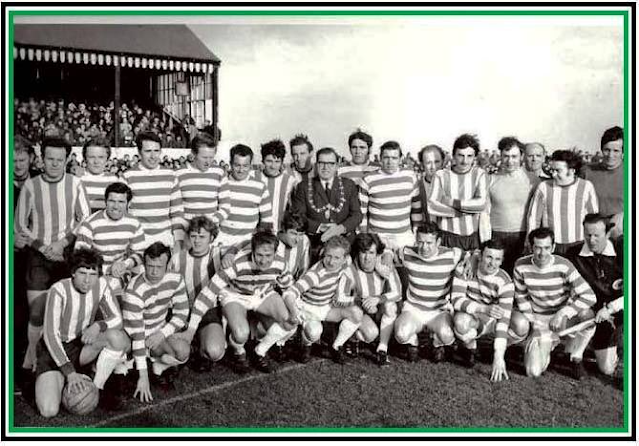Fraserburgh: Setting Sail For The SPFL? | @AlexHTheMAX
Fraserburgh FC have won the Highland League which now gives the Aberdeenshire club a chance to win entry into the SPFL next season. @AlexHTheMAX give us a potted history of the team that has its roots in Scotland's fishing community.
The club from the North East coast of Scotland with the nickname 'the Broch' (burgh) were formed in 1910 and prior to that played as a select side made up of the best players from the local amateur league. The club's colours (consisting of black and white stripes), were acquired from a local fish merchant who had links with Newcastle United and the tradition has since been kept, with the traditional away kit consisting of a sky blue shirt, white shorts and sky blue socks.
Fraserburgh's first ever match was an away tie in the Scottish Qualifying Cup against fierce local rivals Peterhead, which Fraserburgh won 3–1. In their very first season they went on to win the local Aberdeenshire Cup, defeating Buckie Thistle at Pittodrie (Aberdeen FC). Ironically, Buckie have pushed the broch all the way this season in the Highland League title race which went to the very last game of the campaign on April 16th, 2022.
The Broch were granted admission into the Highland League in 1921 and up until that time they competed in the Aberdeenshire Cup and Scottish Cup.
Fraserburgh's most famous victory was in the Scottish Cup on 31st January 1959, where they defeated Dundee FC, one of the top clubs in Scotland at the time, 1–0 at Bellslea Park. This is widely regarded as the biggest ever 'giant killing' shock in the Scottish Cup. Just three years later Dundee were playing in the European Cup and just failed to get to the 1963 final at Wembley v Benfica, after losing to AC Milan in the semi final, despite their defeat of the Italian legends at Dens Park, Dundee.
 |
| Fraserburgh v Celtic in a game that raised £2000 for a fishing boat disaster in 1970. |
On 21st January 1970, the Fraserburgh lifeboat The Duchess of Kent was lost, being turned over by a freak wave approximately 40 miles (64 km) from Fraserburgh while trying to escort the Danish fishing vessel Opal to safety. Only one of the six crew members survived. After the disaster a local hotel worker, called Sydney Reid, who was a staunch Fraserburgh supporter, had the idea to organise a special game to highlight the local fishermen's plight and cheekily contacted Jock Stein at his office in Glasgow. He persuaded the legend to bring his Celtic side side to Bellslea for a fundraising game, which Fraserburgh lost 7–0 (attendance 7,000).
The fundraising match in Fraserburgh was played on April 28th 1970 with Celtic facing Feyenoord of Rotterdam in Milan on May 6th in the 1970 European Cup Final. Celtic fielded Billy McNeill, Jimmy Johnstone, Bobby Murdoch, Bobby Lennox and others that would appear in the San Siro final for the hoops, with Stein using the fundraisinerg match as a gentle reminder that his league winning players would have to stay fit and sharp for the biggest game of their season. He was showing nobody was an automatic pick for Celtic's second European Cup final appearance in three years.
 |
| Celtic play Fraserburgh just days before the 1970 European Cup Final (which they lost 2-1 to Feyenoord) at the San Siro in Milan. |
Stein also spoke in glowing terms about the fishing community in Aberdeenshire (Stein was also from a tough background being brought up in a mining community). He told Scottish media ''these people are important'' when asked why his side were travelling nearly 200 miles, over nearly 4 hours for a friendly on the windswept Scottish coast, just days before jetting to Italy for a historic game against the largely unknown quantity that was Feyenoord at the time.
Another one of Fraserburgh's most memorable games was a 10–0 victory away to local rivals Peterhead in the Highland League Cup on 14th August 1974. They have always had a rivalry with 'The Bloo Toon' (Peterhead took their name from the blue socks that identified Peterhead fishermen in the early 20th century), but as Peterhead were elected into the Scottish league, pre-Scottish pyramid, in the late 1990s the rivalry has wavered a wee bit.
However, Peterhead's largely successful run as a Scottish League side in League 1 and 2 in recent times has fired Fraserburgh up to join them in the SPFL. The Broch will now play off against Lowland League Champions Bonnyrigg Rose Athletic over two legs for the right to play bottom of League 2 Cowdenbeath for a place in the Scottish League next season. The SPFL dream is 360 minutes (and maybe penalties) away for Fraserburgh FC and that rivalry against Peterhead is something everyone in the North East of Scotland would like to see rekindled.
 |
| Cowdenbeath 4-1 Fraserburgh in a 1974 Scottish Cup tie, but the Broch now have ambitions to beat Cowden for a place in the SPFL. (Taken from www.bluebrazil.co.uk) |
By Alex Horsburgh, written for @TFHB.
(All pictures borrowed and NOT owned in any form by TFHB)




Comments